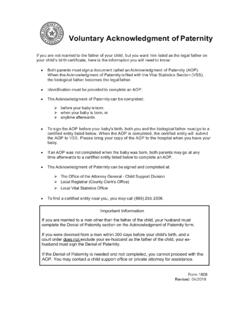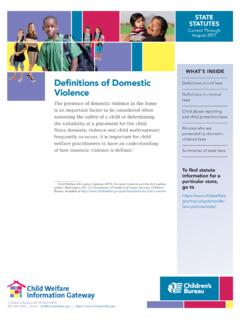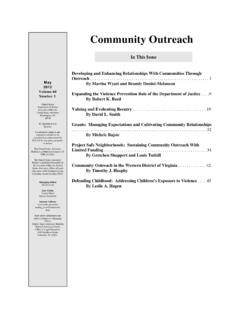Transcription of FOR OUR CHILDREN - Liberty and Justice for Texas
1 1CO-PARENTING GUIDEO ffice of the Attorney General of Texas CHILDREN need and deserve the love, care, and support of both their parents When parents split up, it s hard on everyone in the family , especially CHILDREN . This guide is full of information about ways parents who live apart can work together to take care of their CHILDREN . In this booklet:The Legal Agreement ..Your Safety Is a Priority..What is Co-Parenting, and Why Do It? ..Communicating With the Other Parent .. Talking to Your Kids ..When Your Kids Visit the Other Parent ..Consistency ..How CHILDREN at Different Ages May Be Affected.
2 Conflict With the Other Parent ..Parenting Plan: Basic Elements ..Sample Parenting Plan ..Additional Resources .. 2233568912131523 FOR OURCHILDRENLEARNING TO WORK TOGETHERThe Legal AgreementThis guide does not provide legal advice, nor is it designed to provide guidance for parents who want to change custody or visitation. If you already have a court order for access and visitation and need help understanding it: Get a copy of the order from the court that issued it; Ask your attorney to explain it; or Call the Texas Access and Visitation Hotline toll-free at 1-866-292-4636 (Monday Friday, 1 to 7 ) to speak to a lawyer who can help you understand your order.
3 Calls are answered in English and you do not have a legal order for access and visitation, you may want to contact an attorney for Safety Is a purpose of this guide is to promote healthy co-parenting relationships. If, at any point during your co-parenting experience, you feel unsafe or have safety concerns about the other parent, please contact the appropriate resource listed council on family violence (TCFV) Domestic violence Hotline (NDVH)1-800-799-SAFE (7233)1-800-787-3224 (TTY) Texas Advocacy Project family violence Legal Line1-800-374-HOPE (4673) Is Co-Parenting, and Why Do It?
4 Co-parenting (sometimes called shared parenting ) is when both parents work together as a team to raise their CHILDREN , even after the marriage or romantic relationship is over. This is not a skill that most people are taught, so you may have to do some learning along the way to find out the best way to co-parent in your family . This guide will give you some helpful tips to start learning to co-parent. Many parents have found it helps to take co-parenting or shared parenting classes, both to learn new skills and to hear from other parents who are going through a similar situation.
5 The main reason to work at co-parenting is that it helps CHILDREN deal with all the changes that happen when their parents are no longer together. Even though you may not want to talk to the other parent after the romantic relationship ends, you still have a very important relationship, and it s the most important one of all: a parenting relationship. All CHILDREN need the love and support of both their mother and father. Parents who live apart can still provide these things if they work together and put anger and conflict aside. Communicating With the Other ParentWhen talking to the other parent after a breakup, you may feel the urge to scream, shout, or do other things to tell him or her about the pain and hurt you are feeling.
6 Do everything you can to avoid doing this when your kids can hear you. If talking face-to-face is hard (especially right after the breakup), you might want to use e-mail or even written notes or letters to avoid bringing up old emotional fights. 4 Here are some good reasons to NOT argue with the other parent: Your kids are part mom and part dad, so hearing hurtful things about either parent, especially hearing them from a parent, can hurt your kids self-esteem. Remember that your kids love both of their parents and don t want to hear bad things about either of them. Even though the marriage or romantic relationship is over, you can focus on the parenting relationship.
7 What matters most now is YOUR KIDS!! Arguing about the old relationship only makes it harder to work together as parents for your are lots of good reasons to keep talking with the other parent after the split. Your kids need both dad and mom to participate actively in their lives. Your kids will do better and be happier when they have the love and support of both parents, even if it s from two different houses. Your kids need to see that you can talk with respect to the other parent. Remember that s their mom or dad you re talking to and they love that parent!
8 You can double check what your kids are telling you. Sometimes CHILDREN in this situation will say things that may not be true about what goes on in the other parent s home - like, they get to use curse words at dad s house, or that mom thinks that school is a waste of time. Communicating often with the other parent will help you determine whether or not these things are true. You will both feel more involved in your kids lives. Staying in communication means you know what your kids are up to, even when they re with the other parent. Regular communication can help you keep little misunderstandings from becoming big to the other parent can be stressful, and you don t want to end up fighting and not getting anything accomplished.
9 Here are some tips about how to make the most out of communicating with the other parent so you can get things done in a faster, less stressful way: Think of parenting as a job (maybe even one with a co-worker you don t like). If you talk with the other parent like it s business, you can get right to the point and not waste time and emotional energy on arguments and stress. Respect, or at least try to tolerate, the other parent s parenting decisions remember, you both want what s best for your kids. Set up a regular time to talk with the other parent about your kids. This may not be fun or convenient, but it s important.
10 Remember to make important decisions about your kids together. Talking to Your KidsHelping CHILDREN understand why mom and dad don t live together is hard. If you are just making the decision to separate, it s important to try and talk with the whole family (both parents, the kids, anyone else considered immediate family ) all together. When talking to your kids remember the following tips: Be honest about what has happened or is happening in the family . This doesn t mean you have to go into details about your relationship as a couple. Make sure to think about what your kids can understand at their age and explain it at their level.
















